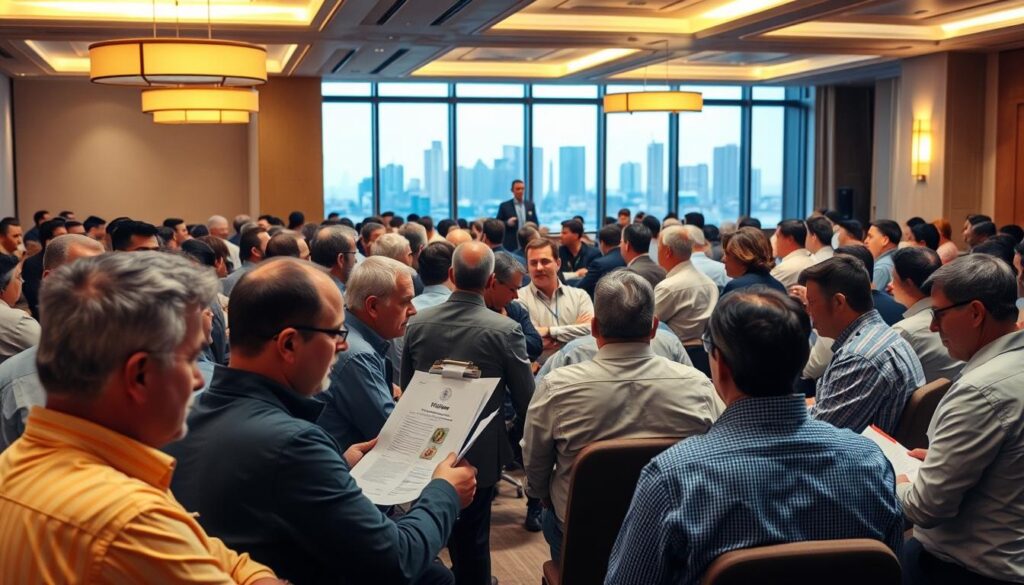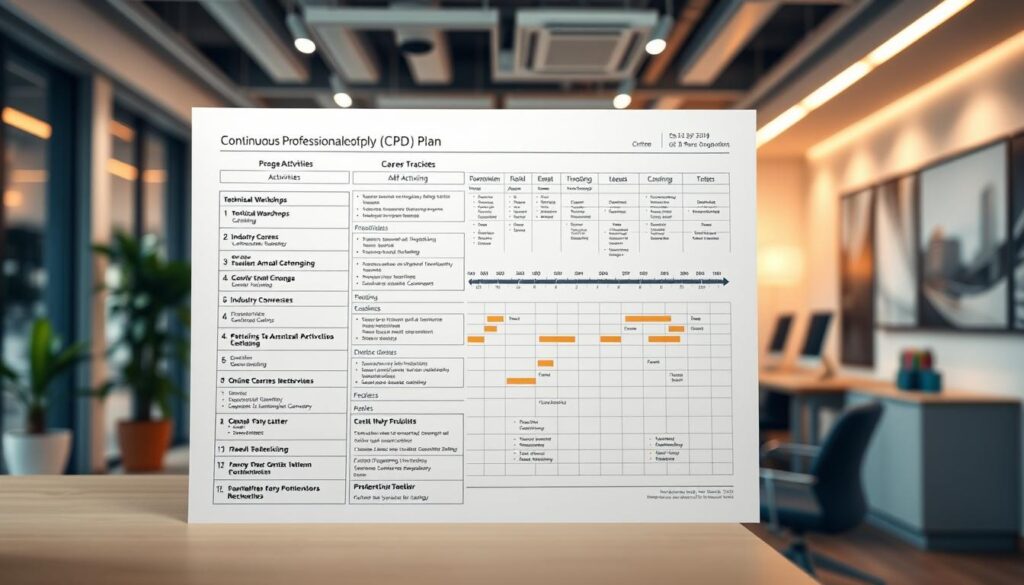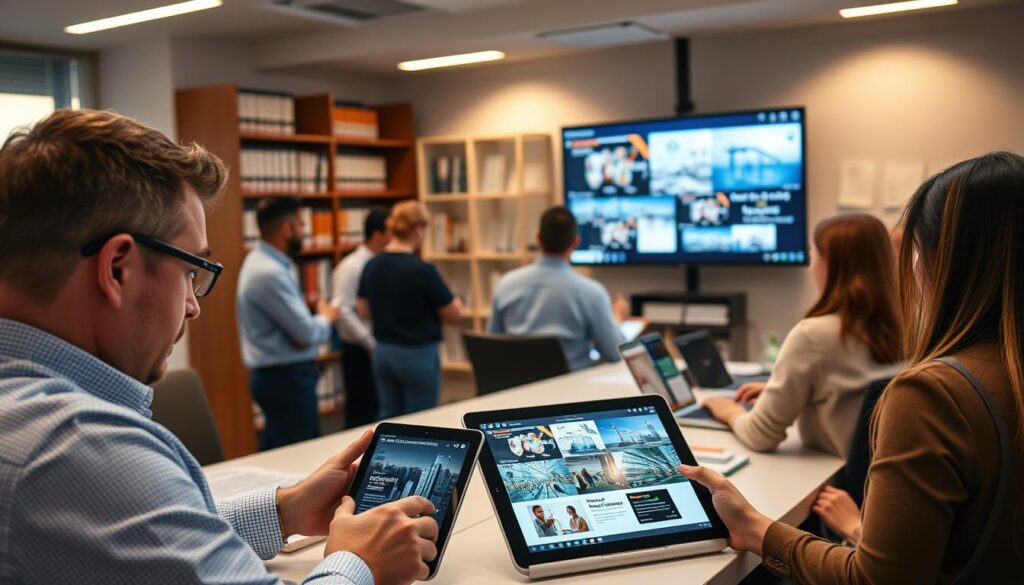In the rapidly evolving field of civil engineering, staying updated with the latest skills and knowledge is crucial. Did you know that a significant percentage of civil engineers believe that continuing professional development is key to career advancement?
Engaging in CPD activities not only enhances your professional skills but also opens up new opportunities. By participating in conferences, webinars, and committee work, you can earn CEUs and stay updated on industry trends. You can also explore various resources, such as those found on LinkedIn, to boost your career.
Key Takeaways
- Enhance your career prospects through CPD activities.
- Stay updated with industry trends and technological advancements.
- Network with professionals to build meaningful relationships.
- Earn CEUs through conferences, webinars, and committee work.
- Gain credentials like PE or Chartered Engineer to boost your marketability.
What is CPD for Civil Engineers?
As the engineering landscape continues to evolve, understanding Continuing Professional Development (CPD) becomes essential for civil engineers. CPD is defined as the systematic process of maintaining and enhancing one’s professional skills, knowledge, and competence throughout their career.
Definition of Continuing Professional Development
Continuing Professional Development (CPD) encompasses a wide range of activities and initiatives that civil engineers undertake to stay abreast of the latest developments in their field. This includes CPD courses for civil engineers designed to update their technical skills and knowledge, ensuring they remain competent and aware of current regulations and best practices.
CPD is not just about attending courses; it’s a holistic approach that includes various learning methods such as workshops, seminars, webinars, and conferences. These activities help engineers gain CPD credits, which are often required for professional licensure and certification.
Importance in the Engineering Field
The importance of CPD in the engineering field cannot be overstated. It ensures that civil engineers are always up-to-date with the latest technologies, materials, and methodologies, thereby enhancing their ability to deliver high-quality projects safely and efficiently.
- Staying current with industry developments and regulatory changes.
- Enhancing professional competence and career opportunities.
- Improving public safety through the application of best practices.
- Supporting lifelong learning and professional growth.
By engaging in CPD activities, civil engineers can not only meet the requirements for licensure renewal but also significantly boost their career prospects. Employers and clients alike value professionals who demonstrate a commitment to ongoing learning and professional development.
Why CPD Matters for Civil Engineers

The importance of CPD for civil engineers cannot be overstated in today’s competitive landscape. As the field continues to evolve with new technologies and methodologies, staying updated is not just beneficial, it’s essential. CPD allows engineers to identify gaps in their skills and knowledge, create a development plan, and record their CPD activities, ultimately enhancing their career prospects and ensuring compliance with professional standards.
Keeping Skills Up to Date
In the civil engineering sector, technological advancements and changing regulations necessitate continuous learning. By engaging in CPD activities, engineers can stay abreast of the latest developments, from new materials and construction techniques to updated building codes and safety standards. This not only improves their professional competence but also contributes to the overall quality and safety of infrastructure projects.
For instance, participating in workshops and seminars on emerging technologies like Building Information Modelling (BIM) can significantly enhance an engineer’s skill set. Moreover, professional development programs tailored for civil engineers can provide targeted training, ensuring they meet the CPD requirements civil engineers need to stay certified and competitive.
Enhancing Career Opportunities
CPD is a powerful tool for career advancement. By expanding their skill set and knowledge base, civil engineers can open themselves up to new career opportunities, whether it’s moving into specialized roles or taking on more senior positions within their organizations. Employers often look for professionals who demonstrate a commitment to ongoing learning and professional development.
Furthermore, achieving CPD certification civil engineers can gain a competitive edge in the job market. This certification not only validates an engineer’s expertise but also showcases their dedication to staying current with industry best practices.
Meeting Professional Standards
Adhering to professional standards is paramount in the engineering field. CPD helps civil engineers meet these standards by ensuring they are up to date with the latest practices, codes, and regulations. This is crucial for maintaining professional licensure and for the overall integrity of engineering projects.
“The key to successful CPD is not just in the accumulation of hours, but in the application of new knowledge and skills to real-world problems.”
By prioritizing CPD, civil engineers can not only enhance their professional standing but also contribute to the advancement of the field as a whole.
Different Types of CPD Activities
To remain competitive, civil engineers must engage in diverse CPD activities tailored to their professional needs. Continuing Professional Development (CPD) is essential for civil engineers to stay updated with the latest industry trends, technologies, and best practices.
Formal Education and Training
Formal education and training programs are a cornerstone of CPD for civil engineers. These can include degree programs, certification courses, and vocational training that enhance technical skills and knowledge. For instance, a civil engineer might pursue a master’s degree in structural engineering to deepen their understanding of complex structures.
Key benefits of formal education and training:
- Enhanced technical skills
- Specialized knowledge in a specific area
- Improved career prospects
Workshops and Seminars
Workshops and seminars offer civil engineers hands-on experience and the opportunity to learn from industry experts. These events cover a wide range of topics, from new construction techniques to project management. For example, a workshop on Building Information Modelling (BIM) can equip engineers with the skills needed to improve project collaboration and efficiency.
“Attending workshops and seminars not only enhances our technical knowledge but also provides a platform to network with peers and industry leaders.” – John Doe, Civil Engineer
Online Courses and Webinars
The rise of online learning has made it easier for civil engineers to access CPD opportunities. Online courses and webinars on topics such as sustainable design, geotechnical engineering, and CPD online courses civil engineers can be completed at one’s own pace, making it ideal for busy professionals.
Some popular online platforms for CPD include:
- Online course providers like Coursera and edX
- Professional organizations offering webinars
- Specialized training websites
Conferences and Networking Events
Conferences and networking events are vital CPD activities that allow civil engineers to stay abreast of industry developments and connect with peers. These events often feature keynote speakers, panel discussions, and exhibitions showcasing the latest technologies and services.
Benefits of attending conferences and networking events include:
- Learning about the latest industry trends
- Networking opportunities with potential collaborators or employers
- Exposure to new technologies and innovations
By engaging in these diverse CPD activities, civil engineers can ensure they remain competent and competitive in their field. Whether through formal education, workshops, online courses, or networking events, the key is to choose activities that align with their professional goals and interests, such as CPD training civil engineers programs.
How to Choose the Right CPD Program

Choosing the appropriate CPD program involves a thorough assessment of one’s professional aspirations and requirements. For civil engineers, this means identifying the skills and knowledge gaps that need to be addressed to advance in their careers.
Assessing Your Professional Goals
To select the right CPD program, civil engineers should start by assessing their professional goals. This involves reflecting on current strengths, weaknesses, and areas for improvement. Setting clear, achievable goals is essential for guiding the choice of CPD activities.
- Identify your career aspirations
- Determine the skills required to achieve your goals
- Evaluate your current level of expertise
Evaluating Course Content and Quality
Once professional goals are established, the next step is to evaluate the content and quality of potential CPD programs. This includes reviewing course materials, understanding the teaching methodologies, and assessing the qualifications of instructors. High-quality CPD programs should offer relevant, up-to-date content delivered by experienced professionals.
For more information on top CPD courses, visit top CPD courses for civil engineers.
Considering Time and Financial Commitments
Another crucial factor is the time and financial investment required for CPD programs. Civil engineers should consider the duration of the program, the cost, and how it fits into their schedule and budget. Effective time management is key to balancing CPD activities with professional and personal responsibilities.
| CPD Program | Duration | Cost |
|---|---|---|
| Structural Engineering | 6 weeks | $500 |
| Project Management | 3 months | $1,200 |
By carefully assessing professional goals, evaluating course content and quality, and considering time and financial commitments, civil engineers can make informed decisions about their CPD. For further guidance on becoming a chartered civil engineer, refer to how to become a chartered civil.
The Role of Professional Organizations in CPD
Professional organizations play a vital role in supporting Continuing Professional Development (CPD) for civil engineers. These organizations offer a wide range of resources and opportunities that are crucial for the ongoing development of professionals in the field.
Key Organizations for Civil Engineers
Several professional organizations are key players in providing CPD opportunities for civil engineers. Notable examples include the American Society of Civil Engineers (ASCE) and the Institution of Civil Engineers (ICE). These organizations offer various CPD activities, such as courses, webinars, and networking events, designed to enhance the skills and knowledge of civil engineers.
Benefits of Membership
Membership in these professional organizations comes with numerous benefits, including access to exclusive educational content and savings on training programs. Members can also participate in conferences and seminars, which provide valuable opportunities for networking and learning from industry experts. For more insights on the importance of CPD, visit PraktisApp Insights.
Resources Available for CPD
The resources available for CPD through these organizations are diverse and comprehensive. Civil engineers can access CPD courses tailored to their needs, as well as CPD credits for participating in approved activities. This ensures that professionals can easily meet their CPD requirements while advancing their careers.
By engaging with professional organizations, civil engineers can stay updated with the latest industry developments, enhance their professional skills, and contribute to the advancement of the engineering field.
The Process of Recording CPD Activities

The process of recording CPD activities is essential for civil engineers to track their progress and identify areas for further development. Maintaining a detailed and accurate record of CPD activities not only helps engineers comply with professional regulations but also enhances their career development.
Importance of Keeping a CPD Log
Keeping a CPD log is crucial for civil engineers as it provides a systematic way to document their ongoing professional development. This log serves as evidence of their commitment to staying updated with the latest industry practices and technologies. According to a survey by the World Civil Society, engineers who maintain a CPD log are more likely to be aware of the CPD requirements civil engineers need to fulfill.
“The most successful engineers are those who can demonstrate a proactive approach to their professional development, and maintaining a CPD log is a key part of this.”
Recommended Tools and Formats
Civil engineers can use various tools and formats to record their CPD activities. Some recommended tools include digital spreadsheets, dedicated CPD software, and mobile apps designed for tracking professional development. The choice of tool often depends on personal preference and the specific requirements of the engineer’s professional body.
| Tool | Description | Benefits |
|---|---|---|
| Digital Spreadsheets | Utilize software like Microsoft Excel or Google Sheets to create customized templates for tracking CPD activities. | Highly customizable, easy to update, and accessible from various devices. |
| Dedicated CPD Software | Specialized software designed specifically for recording and managing CPD activities. | Tailored features for CPD tracking, automated reminders, and compliance checking. |
| Mobile Apps | Apps that allow engineers to log CPD activities on-the-go. | Convenient for logging activities during events or training sessions. |
Frequency of Updates
The frequency of updating the CPD log can vary depending on the engineer’s schedule and the specific requirements of their professional body. However, it is generally recommended to update the log regularly, such as monthly or quarterly, to ensure that all CPD activities are captured accurately and in a timely manner.
By maintaining a regular update schedule, civil engineers can ensure they are meeting the CPD certification civil engineers requirements and staying on track with their professional development goals.
CPD Requirements for Licensure Renewal
Civil engineers seeking to renew their professional licenses must navigate a range of CPD requirements that are state-dependent. “The landscape of CPD is as diverse as the states themselves,” notes a leading professional in the field, highlighting the complexity of meeting these requirements.
To maintain their licensure, civil engineers must comply with specific Continuing Professional Development (CPD) requirements, which vary significantly from one state to another. For instance, some states mandate a minimum number of CPD hours that engineers must complete before they can renew their licenses.
State-Specific Regulations
State-specific regulations play a crucial role in determining the CPD requirements for licensure renewal. For example, engineers in certain states may need to complete a specified number of hours in particular areas, such as ethics or technical skills relevant to their field.
- Some states require CPD hours to be relevant to the engineer’s practice area.
- Others may have a broader set of criteria that include professional development activities.
General Guidelines for Civil Engineering Licenses
While CPD requirements can vary, there are general guidelines that apply to civil engineering licenses across the board. For instance, many jurisdictions require engineers to complete a certain number of CPD hours within a specified renewal period. CEng candidates, for example, need to accumulate 180 hours of CPD before they can apply for their professional review.
“The key to meeting CPD requirements is to maintain a detailed log of your professional development activities,” advises a seasoned civil engineer. “This not only helps in keeping track of your progress but also provides evidence when it’s time to renew your license.”
By understanding and adhering to these CPD requirements, civil engineers can ensure they remain compliant with state regulations and continue to enhance their professional capabilities.
Impact of CPD on Job Performance

By participating in CPD, civil engineers can apply new skills and knowledge to real-world projects, thereby enhancing their job performance. This section will explore the positive impact of CPD on job performance through various case studies and examples.
Case Studies of Successful Engineers
Several civil engineers have benefited significantly from CPD activities. For instance, engineers who participated in CPD online courses have reported improved competence in handling complex projects. One such engineer, after completing a course on sustainable building practices, was able to incorporate eco-friendly designs into their projects, leading to increased client satisfaction and career advancement.
Another example is an engineer who attended a CPD training workshop on advanced structural analysis. This training enabled them to apply new techniques to a critical infrastructure project, resulting in enhanced structural integrity and safety.
Skills Application in Real-World Projects
The true value of CPD lies in its application to real-world projects. Civil engineers who engage in CPD activities can directly apply their new skills and knowledge to improve project outcomes. For example, an engineer who learned about the latest geotechnical engineering techniques through a CPD course was able to design more stable foundations for a large construction project.
Moreover, CPD helps engineers stay updated with industry standards and best practices. This is particularly important in a field like civil engineering, where technological advancements and regulatory changes are frequent. By staying current, engineers can ensure that their projects meet the highest standards of quality and safety.
Overcoming Barriers to CPD Participation
Civil engineers often face numerous challenges when attempting to participate in Continuing Professional Development (CPD) activities, but there are effective strategies to overcome these barriers. Engaging in CPD is crucial for staying updated with the latest industry developments and enhancing professional competence.
Common Challenges for Civil Engineers
Civil engineers encounter several obstacles when trying to participate in CPD activities. Time constraints are a significant challenge, as many engineers have demanding work schedules that leave little room for additional training. Financial limitations also pose a barrier, as CPD courses and seminars can be costly.
Other challenges include:
- Lack of access to relevant CPD opportunities
- Limited support from employers
- Difficulty in finding CPD activities that align with their specific professional needs
Effective Strategies to Engage in CPD
Despite these challenges, there are several strategies that civil engineers can employ to effectively participate in CPD. Prioritizing CPD is essential; engineers should identify their professional development needs and allocate time and resources accordingly.
Seeking employer support is another effective strategy. Many employers are willing to support their employees’ professional development, either financially or by providing time off for CPD activities.
Utilizing online CPD resources can also help overcome barriers. Online courses and webinars offer flexibility and can often be completed at a lower cost than traditional in-person training.
| Strategy | Benefits |
|---|---|
| Prioritizing CPD | Ensures alignment with professional goals |
| Seeking Employer Support | Financial assistance and time off |
| Utilizing Online Resources | Flexibility and cost-effectiveness |
By understanding the common challenges and employing effective strategies, civil engineers can successfully participate in CPD and enhance their professional competence.
Trends in CPD for Civil Engineers

The future of CPD for civil engineers is being shaped by several key trends, including technological innovation and a focus on sustainability. As the engineering profession continues to evolve, it’s essential for civil engineers to stay informed about the latest developments in CPD.
Technological Advances in Learning
Technological advancements are transforming the way civil engineers approach CPD. Online courses, webinars, and virtual reality training are becoming increasingly popular, offering flexible and accessible learning opportunities. For instance, platforms offering CPD certification for civil engineers are on the rise, making it easier for professionals to meet their CPD requirements.
Emphasis on Sustainability and Ethics
There’s a growing emphasis on incorporating sustainability and ethics into CPD programs for civil engineers. This includes training on sustainable practices, environmental impact assessments, and ethical considerations in engineering projects. By focusing on these areas, civil engineers can enhance their ability to deliver projects that are not only technically sound but also environmentally responsible.
| Aspect | Traditional CPD Focus | Modern CPD Focus |
|---|---|---|
| Technological Skills | Basic software proficiency | Advanced software skills, including AI and VR |
| Sustainability | Limited focus | Strong emphasis on sustainable practices |
| Ethics | General ethical guidelines | Detailed ethical considerations in project management |
Bridging Gaps in Emerging Specialties
As new specialties emerge within the civil engineering field, CPD programs are adapting to bridge the knowledge gaps. This includes areas such as green infrastructure, resilient design, and advanced materials. By focusing on these emerging areas, civil engineers can stay ahead of the curve and meet the evolving demands of the profession.
In conclusion, the trends in CPD for civil engineers are centered around technological innovation, sustainability, and emerging specialties. By embracing these trends, civil engineers can ensure they remain competitive and capable of delivering high-quality projects that meet the needs of a rapidly changing world.
Leveraging CPD for Networking Opportunities
CPD serves as a catalyst for civil engineers to build a robust professional network. By participating in various CPD activities, engineers can expand their connections within the industry, fostering collaborations and enhancing their career prospects.
Finding Like-Minded Professionals
One of the significant benefits of CPD is the opportunity to meet and interact with like-minded professionals. Workshops, seminars, and conferences organized as part of CPD programs provide a platform for civil engineers to share knowledge and experiences, creating a community of professionals with similar interests and goals.
These events are not just about learning; they are also about networking. By engaging with peers, civil engineers can gain insights into new trends and technologies, and potentially collaborate on future projects.
Building Mentorship Relationships
CPD also facilitates the establishment of mentorship relationships, which are crucial for the professional development of civil engineers. Experienced professionals can guide less experienced engineers, sharing their knowledge and expertise, and helping them navigate the complexities of their careers.
These mentorship relationships can lead to valuable guidance, support, and potentially even new career opportunities. By leveraging CPD for networking, civil engineers can create a strong foundation for their professional growth.
Developing a Personal CPD Plan

Developing a tailored CPD plan is essential for civil engineers to achieve their professional goals. A well-crafted plan enables engineers to identify their learning needs, set realistic objectives, and select relevant CPD activities.
Setting SMART Goals for CPD
Setting Specific, Measurable, Achievable, Relevant, and Time-bound (SMART) goals is crucial for an effective CPD plan. By doing so, civil engineers can focus on acquiring the skills and knowledge required for their career advancement. For instance, an engineer might set a goal to complete a CPD online course in project management within the next six months.
To illustrate the process of setting SMART goals, consider the following example:
| Goal | Specific Objective | Timeline |
|---|---|---|
| Enhance project management skills | Complete a CPD online course in project management | Within the next 6 months |
| Improve knowledge of sustainable building practices | Attend a workshop on green building technologies | Within the next 3 months |
Identifying Required Skills and Knowledge
Identifying the required skills and knowledge is a critical step in developing a CPD plan. Civil engineers should assess their current competencies and identify areas for improvement. This can involve seeking feedback from peers, mentors, or supervisors. By understanding their learning needs, engineers can select CPD training programs that are relevant and beneficial.
“The key to a successful CPD plan is to align it with your career aspirations and the needs of your organization.” –
To identify the necessary skills and knowledge, civil engineers can follow these steps:
- Conduct a self-assessment of their current skills and competencies.
- Seek feedback from peers and mentors.
- Research industry trends and emerging technologies.
- Align their CPD goals with their career objectives and organizational needs.
By following these steps and setting SMART goals, civil engineers can create a personalized CPD plan that enhances their professional development and contributes to their long-term success.
The Future of CPD in Civil Engineering
The future of CPD in civil engineering is closely tied to the industry’s ability to adapt to new standards and technologies. As the field continues to evolve, professionals must stay committed to ongoing professional development to remain relevant.
Adapting to changing industry standards is crucial for civil engineers. This involves not only staying updated with the latest technologies and methodologies but also being aware of the regulatory changes that impact the profession.
Adapting to Changing Industry Standards
The civil engineering industry is subject to various standards and regulations that are periodically updated. CPD courses help professionals stay compliant with these changes.
- Understanding new building codes and regulations
- Adopting sustainable practices in construction
- Implementing new technologies such as BIM and drones
By participating in CPD activities, civil engineers can ensure they are always up-to-date with the latest industry standards.
Opportunities for Lifelong Learning
Lifelong learning is a cornerstone of professional development in civil engineering. CPD provides numerous opportunities for engineers to expand their knowledge and skills throughout their careers.
| CPD Activity | Benefits | Credits |
|---|---|---|
| Online Courses | Flexible learning, updated knowledge | 10-20 CPD credits |
| Workshops and Seminars | Hands-on experience, networking | 5-15 CPD credits |
| Conferences | Latest research, industry insights | 15-30 CPD credits |
By leveraging these opportunities, civil engineers can continue to grow professionally and contribute to the advancement of the field.
Real-World Applications of CPD Learning

CPD learning has numerous real-world applications that significantly enhance project outcomes for civil engineers. By engaging in CPD activities, civil engineers can apply their knowledge and skills to real-world projects, leading to improved project implementations and professional growth.
Examples of Successful Project Implementations
Several civil engineers have successfully applied CPD learning in their projects, resulting in enhanced project outcomes. For instance, a civil engineer who completed a CPD course on sustainable building practices was able to incorporate green building techniques into a residential project, reducing the project’s environmental impact.
- A civil engineer who attended a CPD workshop on advanced structural analysis was able to apply new techniques to a bridge construction project, improving the bridge’s safety and durability.
- Another civil engineer who participated in a CPD webinar on project management best practices was able to streamline the project timeline, resulting in cost savings and improved client satisfaction.
Transferable Skills across Disciplines
The skills gained through CPD are often transferable across disciplines, enhancing the versatility of civil engineers. For example, a civil engineer who completes a CPD course on data analysis can apply these skills to various projects, including those outside their immediate area of expertise.
Key transferable skills include:
- Project management skills
- Data analysis and interpretation
- Leadership and teamwork skills
By acquiring these skills, civil engineers can expand their professional capabilities and take on new challenges in their careers.
Case Studies on the Benefits of CPD
The benefits of Continuing Professional Development (CPD) for civil engineers are best illustrated through real-life case studies. These examples not only highlight the achievements of successful civil engineers but also provide valuable insights into the lessons learned from their participation in CPD activities.
Highlighting Successful Civil Engineers
Several civil engineers have made significant strides in their careers through CPD. For instance, a structural engineer who participated in a CPD program on advanced materials was able to apply the knowledge gained to a major infrastructure project, resulting in cost savings and improved structural integrity. As noted in a LinkedIn article on continuous learning, “CPD is key to success in the civil engineering field,” enabling professionals to stay updated with the latest technologies and methodologies (Continuous Learning).
Another example is a civil engineer who attended a CPD workshop on sustainable design practices. The engineer was able to incorporate these practices into a subsequent project, enhancing its environmental sustainability and earning recognition within the industry.
Lessons Learned from CPD Participation
The case studies reveal several key lessons:
- CPD activities help civil engineers stay current with industry developments, enhancing their professional competence.
- Participation in CPD can lead to innovative solutions and improved project outcomes.
- Networking opportunities through CPD events can result in valuable professional connections and collaborations.
A quote from a renowned civil engineer emphasizes the importance of CPD: “Continuing Professional Development is not just about fulfilling a requirement; it’s about staying relevant and competitive in a rapidly evolving field.”
“The future belongs to those who believe in the beauty of their dreams.” – Eleanor Roosevelt
The following table summarizes the benefits of CPD for civil engineers based on the case studies:
| Benefits | Description | Outcome |
|---|---|---|
| Enhanced Professional Competence | Staying updated with the latest industry developments | Improved project outcomes |
| Innovative Solutions | Applying knowledge gained from CPD activities | Cost savings and improved structural integrity |
| Networking Opportunities | Connecting with professionals through CPD events | Valuable collaborations and career advancement |
In conclusion, the case studies demonstrate the significant benefits of CPD for civil engineers, from enhanced professional competence to innovative solutions and valuable networking opportunities.
Conclusion: Elevate Your Civil Engineering Career with CPD
As a civil engineer, investing in Continuing Professional Development (CPD) is crucial for career advancement and staying updated with industry standards. By engaging in CPD online courses and CPD training, you can enhance your skills and knowledge, leading to improved job performance and new career opportunities.
Take the First Step
To start your CPD journey, assess your professional goals and identify areas where you need improvement. Look for CPD programs that align with your objectives, such as CPD online courses civil engineers can undertake to stay current with the latest technologies and methodologies.
Lifelong Learning for Sustained Success
Embracing lifelong learning through CPD is key to sustained career success. By committing to ongoing education and training, you can stay ahead in the competitive civil engineering field and achieve your career aspirations. Explore available CPD training civil engineers can benefit from and take the first step towards elevating your career today.
